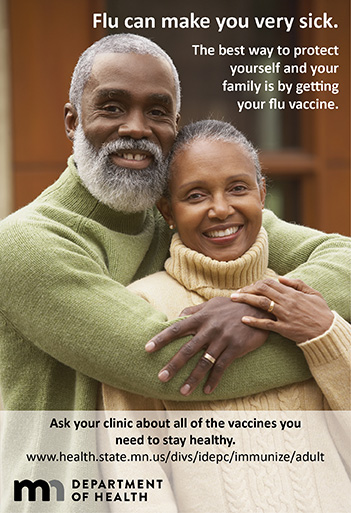
 Influenza, also called flu, makes thousands of Minnesotans sick every year. This can cause them to miss work and school. While most people get better, the flu can be dangerous enough to lead to hospitalization, and even death in some cases. You can help protect yourself and your family by getting a flu vaccine every year. Everyone 6 months of age and older should get vaccinated, but it is especially important for young children, pregnant women, older people and those with long-term health conditions. No one should skip their flu vaccine because even healthy people can become very sick from flu.
Influenza, also called flu, makes thousands of Minnesotans sick every year. This can cause them to miss work and school. While most people get better, the flu can be dangerous enough to lead to hospitalization, and even death in some cases. You can help protect yourself and your family by getting a flu vaccine every year. Everyone 6 months of age and older should get vaccinated, but it is especially important for young children, pregnant women, older people and those with long-term health conditions. No one should skip their flu vaccine because even healthy people can become very sick from flu.
Along with a flu vaccine, adults need other vaccines, too. Some diseases are more common or more dangerous as we get older, but vaccines can help keep you healthy. Some adults may not have gotten certain vaccines because they were not available when they were children. Each year, thousands of adults in the United States suffer from serious illnesses that could have been prevented by vaccines. Ask your clinic about the following vaccines at your next visit:
- Tetanus, diphtheria, pertussis (Td or Tdap): All adults need a Tdap vaccine one time, and then a Td vaccine every 10 years. Pregnant women need a Tdap vaccine during every pregnancy.
- Measles, mumps, rubella (MMR): Many adults need a second dose of this vaccine to be fully protected against the measles. This vaccine also protects against mumps and rubella disease.
- Varicella, also called chickenpox: You may need this vaccine if you never had chickenpox disease.
- Human papillomavirus (HPV): If you are 26 or younger, make sure you have been vaccinated to prevent certain kinds of cancer.
- Zoster, also called shingles: Older adults may need this vaccine to be protected against this disease. Shingles disease can cause a very painful rash that may last for several months.
Many long-term health conditions like diabetes or asthma place adults at higher risk for problems if they get sick. Even if you usually feel healthy, these health conditions may worsen when your body is fighting another disease like the flu or pneumonia. If you see your doctor for any long-term health condition, ask if you need any of the following vaccines:
- Pneumococcal: There are two types of pneumococcal vaccine, ask your doctor if you need both. The vaccines help prevent infections in the lungs, blood, and lining of the brain or spinal cord.
- Meningococcal: This vaccine protects against a rare but dangerous infection.
- Hepatitis A and B: These vaccines protect you from viruses that cause liver disease.
If you travel outside of the United States, you may need additional vaccines. Ask your clinic what you may need as soon as you know your travel plans.
We need vaccines throughout our life to help us stay healthy. Talk to your clinic about what vaccines you need. If you are worried about the cost of vaccines, talk to your clinic. There are some clinics in Minnesota that offer free or low-cost vaccines for people who do not have health insurance.










